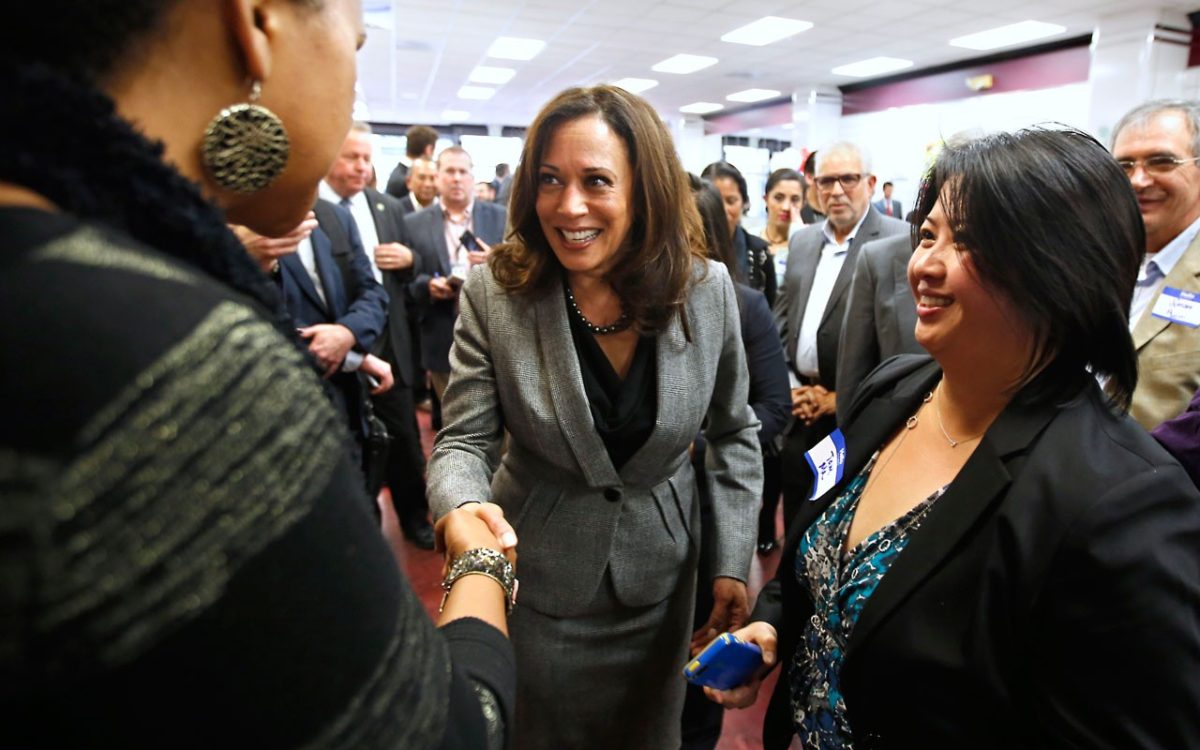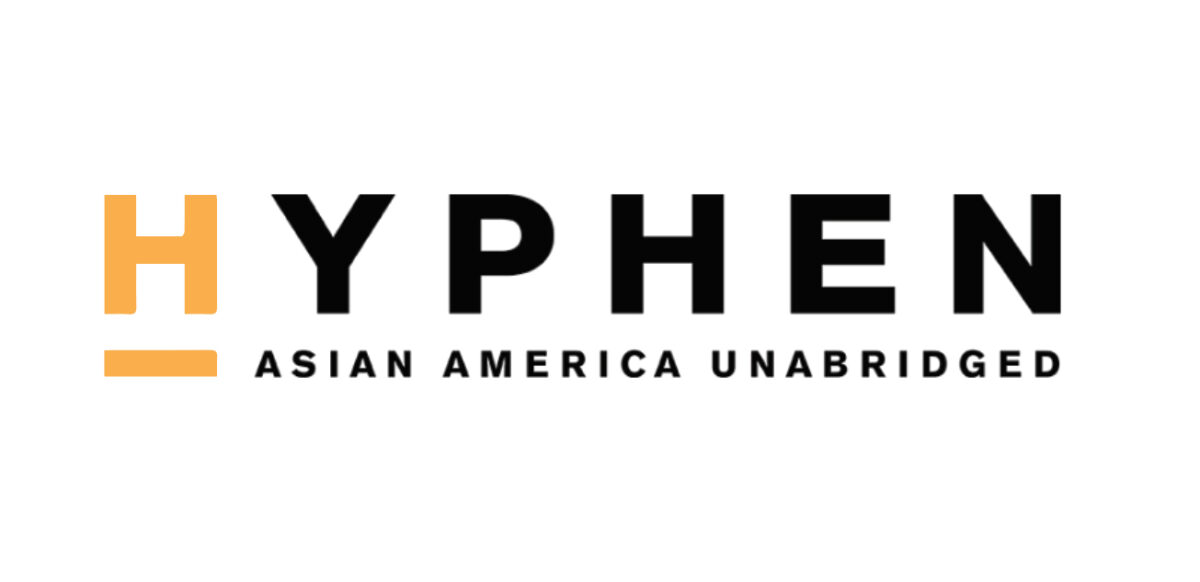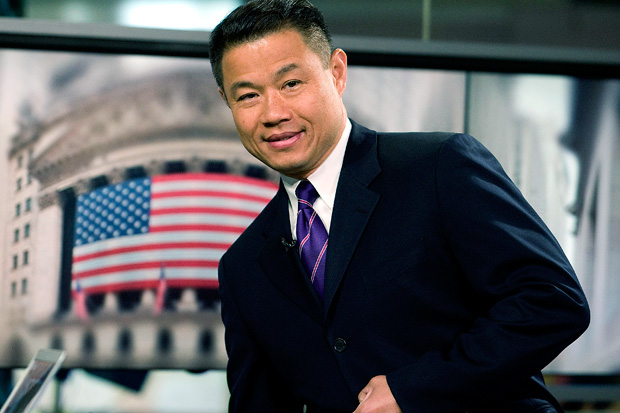
Late last week, I wrote about New York Lt. Governor candidate Tim Wu’s endorsement of State Senator hopeful John Liu’s campaign. Both men are Taiwanese American politicians; in his endorsement, Wu called Liu and another Asian American State Senate candidate, SJ Jung, Asian American “underdogs” and a “band of brothers”. Wu cited the persistent underrepresentation of Asian Americans in New York’s political leadership in saying, “We could use a stronger Asian-American voice in the legislature.”
Liu responded with a scathing and abrupt rejection of Wu’s endorsement, saying,
“Just to be clear: I do not know this person, I have not met this person and I’m not interested in accepting endorsements from people I have never heard of before.”
This story had me equal parts baffled and titillated: one Asian American politician publicly slapping away the hand of another?
What could possibly cause John Liu, a man who at one time championed stronger Asian American voices within elected office, to eschew the support of a fellow Asian American “brother”? Why haven’t Asian American political representatives come out in support (even begrudging support) for Tim Wu, a man with a legitimate shot at being New York’s first Asian American elected to statewide office?
What the heck?!?
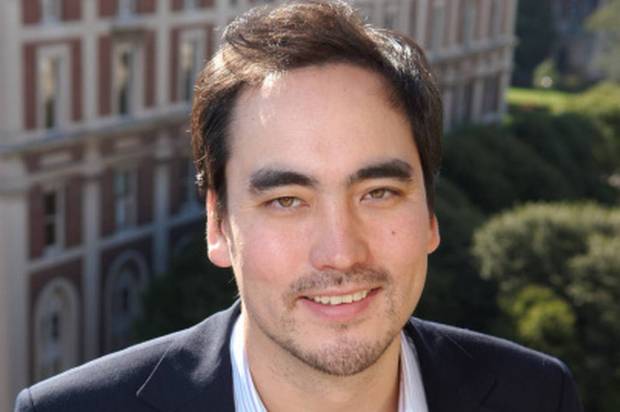
It’s common within political circles for two candidates — even two candidates who share a lot in common in terms of politics and political ideologies — to simply not like each other; it’s far less common to openly reject a supporter without a clear, conscious reason.
In my post, I speculated that perhaps John Liu was worried about enraging his Chinese American nationalistic partisans who oppose the democracy movement, which Wu’s father was an early leader in. Wu, last week, drew attention to his father’s political passions as an agitator for Taiwanese independence, and said he took inspiration from his father’s commitment to the struggle for Chinese democracy. For Liu to accept support from Wu might rile up Chinese American supporters who refute Taiwan’s independence. In retrospect, I was perhaps distracted by biased reporting from pro-democracy (and very much anti-John Liu) news outlet, the Epoch Times; much of what was reported by that source could not be verified anywhere else on the internet. Alternatively, I speculated that Liu might disavow Wu’s support because Wu has made his opposition to Time Warner/Comcast’s pending billion dollar merger his central campaign issue; both cable giants are major supporters of minority civil rights non-profits, which some have speculated is why a coalition of the nation’s largest minority social justice organizations came out against net neutrality earlier in the summer.
But, the real reason why Liu repudiated Wu might be much more straightforward and mundane than my speculations of last week would suggest, if equally as important. It might all come down to Democratic party politics in New York.
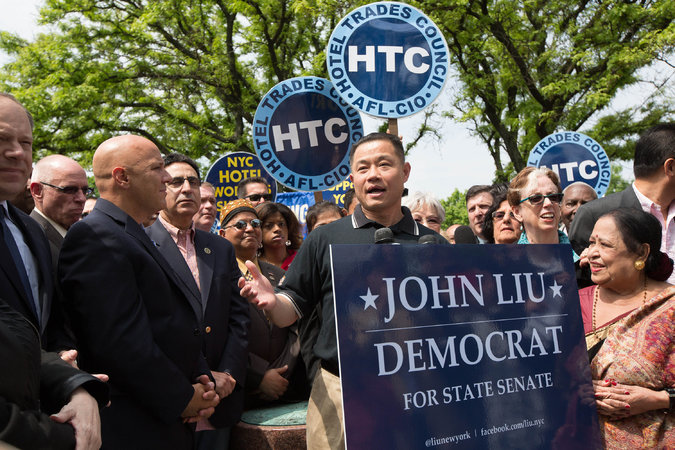
John Liu is well-known among Asian American New Yorkers for being the first Asian American elected to city-wide office in New York City when he was voted into the position of City Councilman in 2001. Liu remained a fixture in NYC politics for the next decade, and was later elected to the City Comptroller’s office in 2009. However, in 2011, Liu’s campaign was the target of a federal investigation related to accusations of straw donors and inappropriate donor bundling; while no federal charges were ever filed against Liu himself, several campaign aides were arrested, found guilty, and sentenced for fraud. The suspicion of shady campaign finance plagued Liu through his 2013 mayoral bid, and he was able to win over a mere 7% of the vote. Although Liu has always enjoyed strong support from Asian American voters, his reputation even among Asian Americans took something of a hit in 2011; by 2013, about 50% of Asian Americans still voted for Liu in the Democratic primary for the mayoral race, but even within some predominantly Asian neighbourhoods, Liu was unable to beat out DeBlasio. This was a more than 30-point drop in support from 2009, when Liu was able to win 84% of Asian American voters in his bid for City Comptroller.
His embarrassing defeat in last year’s mayoral primary signaled trouble in paradise for Liu, and his run for State Senate this year is an attempt at a political comeback. But, more significantly, Liu’s campaign is part of a larger effort by New York’s Democratic establishment to wrest back control from state senators who defected to the Independent Democratic Conference (IDC), a caucus of five Democrats who in the last few years have broken away from state Democratic leadership and allied themselves with Republicans in New York’s state legislature. Although the IDC’s leadership has vowed to end their alliance with Republicans this year, it’s clear that mainline Democrats are hoping to unify Democratic power within the state by ousting Democrats who caucused with the IDC in the last session. Among those state senators? Liu’s current opponent, incumbent Tony Avella.
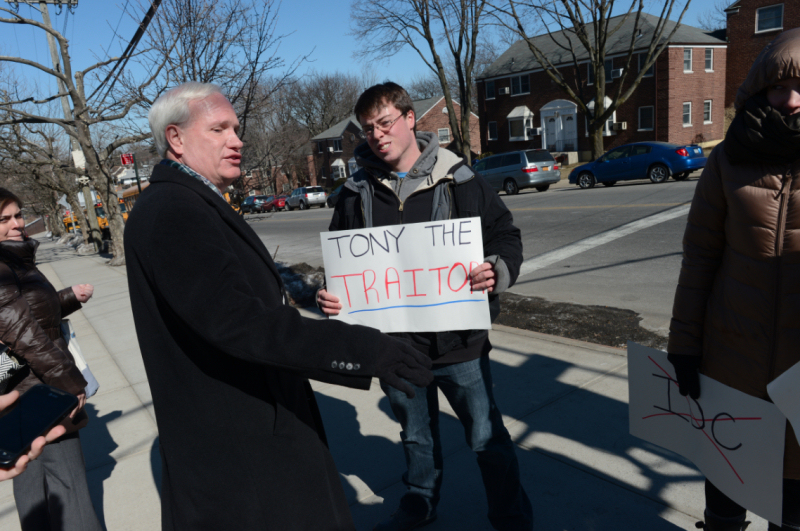
John Liu is a fixture among Asian American politics, but as a career politician, he is also an establishment Democrat with deep ties to New York’s mainstream Democratic party. This year, on the heels of Liu’s devastating loss in the mayoral primary race, mainstream Democrats tapped Liu to remove Avella from office, a clear effort to punish Avella for refusing to toe the party line. Liu has made Avella’s break from mainstream Democrats a major point of attack; in a recent debate, he said:
“The reality is this Tony, you left the Democrats in the State Senate and you sided with the Republican leadership, there’s no question about that,” Liu said. “You can say I.D.C. this, I.D.C that. The fact of the matter is because of you [Democratic Conference leader] Andrea Stewart Cousins is not the Democratic leader, instead [Republican leader] Dean Skelos is controlling the agenda. You can say as much as you want that you’re in favor of minimum wage increase, you can say as much as you want that you’re in favor of women’s equality, but you supported Dean Skelos.”
That mainstream New York Democrats are throwing the full force of their support behind Liu can be discerned from the sheer number of major labour union and media endorsements he has earned, as well as the ability to out-fundraise Avella by a factor of 3-to-1 (although some from questionable sources). But that support also comes with something of a cost: with Liu as the face of Democratic “unity” (re: punishment of erstwhile Democrats) in this year’s city- and state-wide campaigns, Liu’s attention is entirely focused on winning new seats for those who will caucus with the Democratic establishment, while protecting the seats the Democratic conference already controls in the State Legislature.
As a political wonk, I understand the worthiness of this goal. But, Liu’s rejection of Tim Wu’s endorsement also demonstrates what happens when this partisan Democratic agenda crosses paths with efforts to increase Asian American political power.
Kathy Hochul — Tim Wu’s opponent for the Lt. Governor’s race — is another fixture in New York state politics, having served as a US Congresswoman after her term as Eerie County Clerk. She is another establishment Democrat and career politician. Over the summer, she all but endorsed John Liu. Meanwhile, Kathy Hochul has earned the backing of other Democratic establishment Asian American politicians, including Rep. Grace Meng, Councilwoman Margaret Chin and others. These same Asian Americans have also refused to support Korean American SJ Jung, a young activist and businessman looking to unseat State Senator Toby Stavisky, who is running as a political reformer. Stavisky, on the other hand, is an assistant leader for the Democratic Conference in the State Legislature. Meng, Chin and others have all chosen to endorse Stavisky over Jung.
Tim Wu and his running mate Zephyr Teachout allege that Democratic mainstays have gone so far as to invest millions of party dollars into support for the Cuomo/Hochul ticket, in hopes of retaining establishment candidates on the ticket in November; the two independent Democrats are arguing that for the party to both hold a primary and invest in one of the candidates is a clear conflict of interest and have filed a lawsuit against the party in protest. Wu explains the lawsuit in greater detail in an op-ed published today.
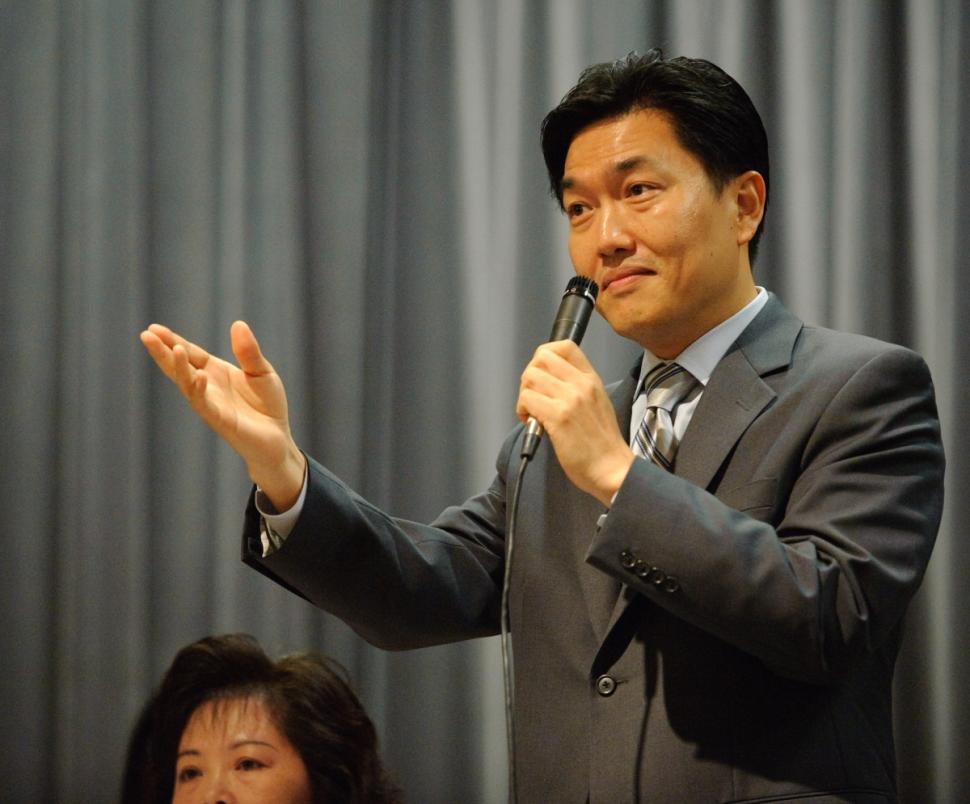
So much for prioritizing Asian American voices in New York’s state legislature? It seems that New York Democrats, including its Asian American politicians, might be interested in elevating Asian American voices in politics, but are more interested in elevating only the Asian American voices of those who will play ball with establishment Democrats.
Last week, Tim Wu declared himself, Jung and Tim Wu a “band of brothers” based on shared Asian American identity and progressive ideology. But, it seems that as far as John Liu and other Asian American elected officials are concerned, these ethnic ties simply don’t run as deep as Liu’s Democratic party interests. Wu, Jung and Liu may all be Asian Americans in close races against White candidates, but this is where the similarity ends: John Liu is the establishment in tomorrow’s primary race, whereas Tim Wu and SJ Jung are anything but.
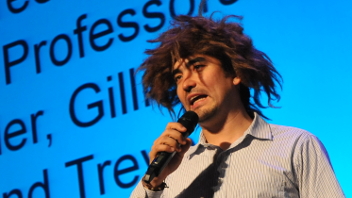
Ironically, Liu’s establishmentarian mission has found him allying far from his own political ideology: Liu is a progressive pro-immigration and anti-charter school Democrat, who accepts support from a blue dog Democrat like Kathy Hochul over the uber-progressive, hipster-chic Tim Wu. It all goes to show that politics makes for very strange bedfellows.
As I said above, I understand the need for partisans to build unified support, and I don’t necessarily approve of a Democrat allying with Republicans to vote against progressive interests (as Avella and other IDC members did). Nor do I support voting for candidates based on skin colour alone; just because a candidate shares my race doesn’t automatically mean I will support them.
But, in this case, Tim Wu and SJ Jung aren’t just Asian American politicians, they are Asian American politicians with energetic voices and smart ideas; yet they are being largely shut out of the process by a Democratic party that has basically closed ranks around its own members. The political process in this country is one that I think has been failed by the overwhelming control that the two major parties have in determining viable candidacies. If democracy is strengthened by a diversity of ideas and interests, than independent and anti-establishment candidates like Tim Wu and SJ Jung shouldn’t be shut out of the process by the efforts of veiled cronyism. There’s something distasteful about the degree to which their campaigns are being marginalized and left out in the cold as collateral in the name of Democratic “unity”. When political support is based more on the size of a candidate’s rolodex than on the quality of their ideas, than the only people who lose out are the voters.
So, when you go out to vote in tomorrow’s Democratic primary in New York tomorrow, I urge you to vote based on platform and politics. Don’t vote based merely on party affiliation or shared racial identity, but based on which candidate you think has the best ideas for you and your neighbourhood.
I earnestly think that a vote for John Liu over Tony Avella tomorrow will be the right vote for progressive Democrats living in New York’s 11th district; but I also worry that a vote for John Liu is a vote to reinforce the monopolistic hold that Democrats have over politics in New York that shuts out radical and fresh voices like Tim Wu and SJ Jung’s.

